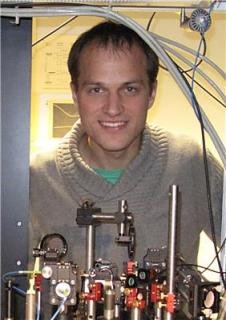Nov 30 2015
Dr. Christian Groß, a young research scientist working in the Quantum Many-Body Systems Division of Professor Immanuel Bloch at the Max Planck Institute of Quantum Optics (Garching near Munich), has been selected by the European Research Council as one of the recipients of an ERC Starting Grant for the year 2015.
 Dr. Christian Groß (Photo: MPQ)
Dr. Christian Groß (Photo: MPQ)
The European Research Council, founded in 2007, is the first pan-European funding body. The ERC Starting Grant supports excellent projects of creative young scientists over a period of five years. Dr. Christian Groß has won the grant for his project “Rydberg dressed quantum many-body systems”. The project will experimentally study long-range interacting atomic quantum many-body systems with tailored microscopic interactions. As such, it opens new directions for atomic quantum simulation and paves the way towards a variety of experimental studies, ranging from quantum simulators for solid state physics or the design of quantum magnets to the exploration of the “supersolidity” of ultracold bosonic systems.
Christian Groß studied physics at the Johannes-Gutenberg-Universität Mainz where he received his diploma in 2006. He then went to the the Ruprecht-Karls-Universität Heidelberg where he finished his doctoral thesis “Spin queezing and non-linear atom interferometry with Bose-Einstein-Condensates” in 2010. During his first year as a postdoc he continued to work in the research group “Synthetic Quantum Systems” of Prof. Markus Oberthaler who had been supervisor of his doctoral thesis. In 2011 his research work was honoured with the PhD thesis prize of the Section “Atoms, Molecules, Quantum Optics and Plasmas” of the the German Physical Society (DPG) as well as with the Ruprecht-Karls-Preis of the University of Heidelberg. Since 2011 he has been project leader in the Quantum Many-Body Systems Division of Prof. Immanuel Bloch at the Max Planck Institute of Quantum Optics (MPQ).
During the past years at MPQ Dr. Groß studied the behaviour of ultracold quantum systems under a variety of aspects. For instance, he investigated under which conditions ultracold atoms in optical lattices would make a transition into an extremely well ordered state, a so-called Mott insulator. In these experiments he used a novel imaging method developed in the group, a quantum gas microscope which provides single-site single-atom resolution. In other experiments Dr. Groß handled many-body systems made of highly excited Rdyberg atoms. There he was able to observe how the particles would assembly to certain patterns because of the long-range interaction induced by the excitation.
His ERC project will profit from his experience in both fields. “Experimenting with highly excited Rydberg atoms we face the problem of their extremely short life-time. In the new project the atoms will be excited only to a very small extent. That way we induce a long-range interaction combined with a much longer life-time. In particular, we will be able to control the strength, the distance dependence and the isotropy of the interaction,” Christian Groß explains. The many-body systems made of such “Rydberg dressed” potassium atoms are supposed to allow novel kinds of quantum simulations, for example the correlated behaviour of many quantum magnets.
The young scientist considers his ERC project to be “high risk, high gain”. The risk lies in the high complexity of the experiment. Also, the question of the stability of these systems is not yet fully answered and a large parameter space has to be explored to minimize decoherence. Here, the tuning is huge, and many different “knobs” are available. However, the gain in prospect is a breakthrough in the research of exotic quantum matter. “As the systems under investigation are purely bosonic we expect to find a new phase of matter of unprecedented supersolidity which combines the properties of a crystal and the behaviour of a suprafluid.”